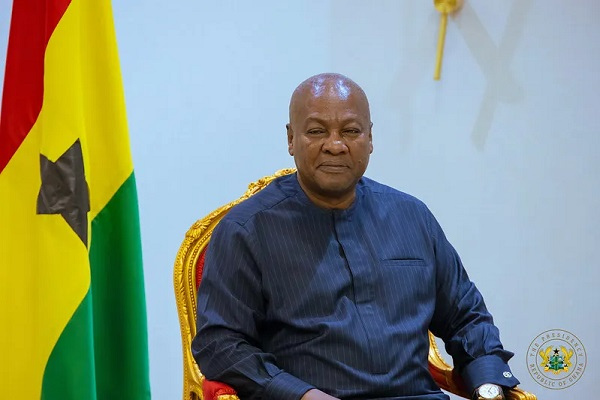 President John Dramani Mahama
President John Dramani Mahama
The chiefs and people of the Gwira Traditional Area in the Nzema East Municipality of the Western Region have appealed to the government to provide communities in the area with essential social amenities.
The chiefs expressed concern that the lack of social infrastructure continues to hinder development, welfare, and the overall well-being of the people of Gwira.
According to the traditional rulers, the poor road network remains the most pressing challenge, directly impacting social and economic activities.
The Paramount Chief of the Gwira Traditional Area, Awulae Angama Tu-Agyan II, presented these concerns to Western Regional Minister Joseph Nelson during a recent courtesy call. He emphasized that poor road infrastructure is the most urgent social issue confronting the area.
“All commercial activities, including farming, are hampered by the negative impact of our poor road network,” he stated.
The paramount chief made this presentation on behalf of the Gwira Traditional Council at a meeting with the Regional Minister last Friday.
According to Awulae Angama Tu-Agyan II, his subjects have repeatedly complained about the deplorable state of roads in virtually all the communities.
“As we speak, there is no single bridge in the area, and the only colonial bridge that existed has collapsed. It feels as if successive governments have neglected us,” he lamented.
He explained that the colonial bridge was constructed in 1958 and has remained in a deteriorating state, requiring urgent replacement.
Consequently, he personally traveled to Takoradi to engage with Highway authorities for the timely replacement of the collapsed bridge, but his efforts have yet to yield results.
The outspoken chief recounted that during the height of the 2024 electioneering campaign, he had the opportunity to meet President John Dramani Mahama, the flagbearer of the NDC, at Gwira Kutukrom, where he reminded him about the poor state of roads in the area.
Beyond the poor road conditions, Awulae Angama Tu-Agyan II also highlighted the poor telecommunication network, which has been affecting academic performance in schools.
“Without access to a quality network, mobile phones become useless, and teachers posted here continue to use these challenges as an excuse to vacate their posts,” he noted.
Recognizing the contribution of former President John Dramani Mahama’s administration to education in the Gwira Traditional Area—including the establishment of a Senior High School—the chief commended the NDC for being at the forefront of expanding education in the region and across the country.
He, therefore, appealed to President Mahama to provide boarding facilities for the area’s first Senior High School to facilitate its upgrade.
“Last year, the school ranked fourth in academic performance, which shows that if we had boarding facilities, the school could achieve even greater results,” he emphasized.
Acknowledging the difficulty in retaining teachers in the area, the traditional council collaborated with stakeholders to ensure that National Service personnel were posted to communities in the region. These personnel are being motivated to remain in the classrooms instead of abandoning their posts due to the numerous challenges they face.
Regarding electricity, he noted that virtually all communities in the area are now connected to the national grid.
On security, the paramount chief revealed that many communities remain vulnerable due to the absence of police posts to monitor and ensure safety.
“Only Dominace has a police station in the entire Gwira Traditional Area. We need police posts in Banso, Kutukrom, Tabakrom, and other areas,” he stated.
In addition to police posts, he stressed the need for a fire service station to protect residents from recurring fire outbreaks.
The chief also appealed to the Regional Minister to lobby for job creation in the area to curb truancy, laziness, and the growing menace of youth unemployment.
“We feel helpless at the moment because many of our youth are turning to tramadol and other hard drugs, which are destroying their lives due to a lack of opportunities and jobs,” he concluded.
